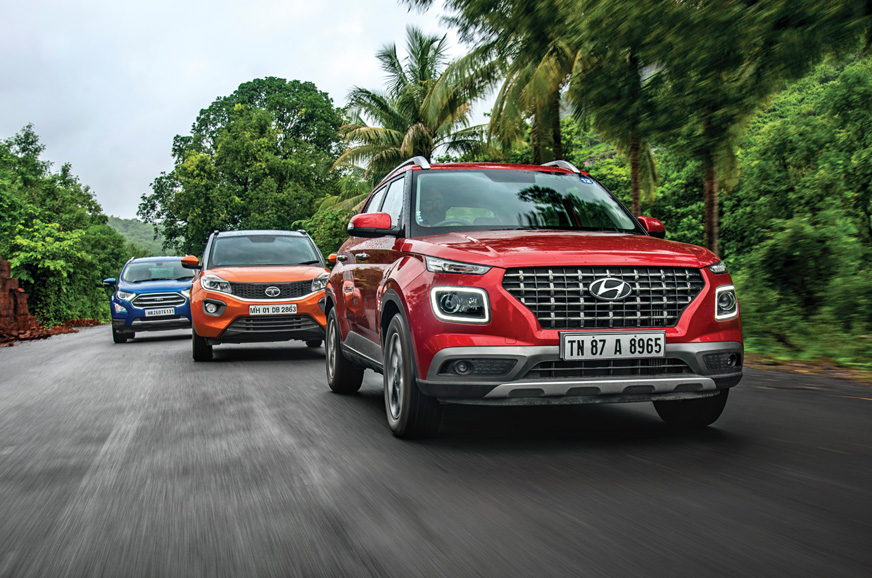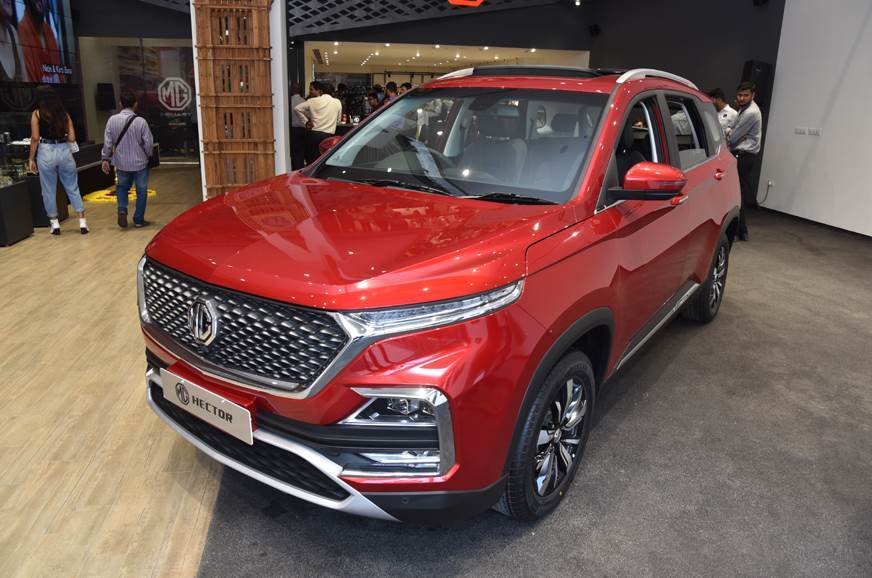
At last count, over 45,000 buyers had put their money down for the Hyundai Venue. And of those 45,000, 36 percent opted for the petrol-automatic version. To many, it would seem a small but high-riding automatic SUV is a perfect antidote to our congested and poorly paved roads. Question is, is the Venue DCT the best petrol-automatic compact SUV you could buy? To answer just that, we’ve brought along the alternatives – the Ford EcoSport and the Tata Nexon. What adds a layer to this comparison is the fact that each of these SUVs uses a different type of transmission. Where the Venue uses a DCT or dual-clutch unit, the EcoSport features a torque-converter auto. The Nexon, on the other hand, relies on the more cost-effective solution of an AMT. We’re out to find the model that offers the most in convenience and comfort.
Townies
A quick on-paper comparison immediately establishes the Venue at the sharp end of the field. The Hyundai’s 1.0-litre, three-cylinder engine is the smallest here but thanks to turbocharging and direct injection it makes a healthy 120hp and 172Nm of torque, the latter being the highest in this comparo, if only just. The Venue’s 7-speed dual-clutch transmission also wins the Venue some bragging rights over its rival’s 6-speed setups. In mundane urban driving, the Venue is an easy SUV to like. The engine is quiet, part-throttle responses are pleasant and the gearbox does its job unobtrusively. You really won’t be party to the upshifts and downshifts the transmission deems necessary to balance performance and efficiency in town. In the everyday grind, you simply won’t have reason to complain. The light steering, good visibility and absorbent low-speed ride also contribute to make the Venue driving experience quite relaxing.
You’ll have to make your peace with a few idiosyncrasies in the EcoSport. For one, the thick A-pillar obstructs visibility and ever so often you’ll have to peer sideways to get a good look out. Then there’s the gearbox, itself. The 6-speed torque converter auto is nice and obedient when in the flow of things, but in on-off accelerator inputs in town, it’s not the smoothest and tends to lurch between gears. Learn to be gentle with the throttle and you’ll get the best out of the Ford gearbox. Of the other things, the Ford’s steering is easy to twirl in town and the suspension is pliant enough, even if there is quite a bit of movement on large potholes and the like. It’s important to mention that we used a new EcoSport automatic with 16-inch rims to judge ride and handling. The model used for photography rides on 17-inch rims that have been discontinued following customer complaints of tyre damage.
The Nexon is on the back foot in this comparison. Its AMT simply isn’t as sophisticated as the setups on the other SUVs and you can tell as much on the move. In smooth-moving traffic, you’ll often get an upshift when you don’t expect one and the subsequent pause in power can be irritating. There isn’t all that much shift shock but gear changes aren’t what you’d call slick. Tata’s 1.2-litre turbo-petrol engine’s hesitant low-speed power delivery is another sore point in town and you will have to shuffle through the drive modes to get the most from the engine. You will also find yourself pushed to switch the gear lever to manual mode, every now and then – particularly on long inclines where the gearbox fumbles between ratios. If not engine and gearbox, the Nexon has some other strengths. A light steering adds a dose of convenience, and on bad sections of road, you’ll feel the most secure in the Nexon. There is a firmness to the ride but the sensation is of being in a fairly rugged SUV. Wish visibility, especially out the rear windscreen, was better though.
My way or the highway
It’s outside of city limits that we get a more holistic view of performance and comfort. And the big surprise is the Venue. It might not feel it but it’s the quickest through the gears and in outright acceleration too, with a 0-100kph time of 11.90sec versus the EcoSport’s 13.22sec and Nexon’s 15.18sec timings. Pressing down on the accelerator results in a momentary pause for downshifts that’s followed by a strong turbo-aided tug as the engine pulls cleanly past 6,000rpm. Sport mode speeds up responses and manual mode (operated via the gear lever) is great fun too, though the electronics won’t grant a high-rpm downshift. What marks the Venue down from being an all-out fun SUV is the steering that doesn’t give a great sense of connect and the ride that feels floaty at triple-digit speeds.
Keen drivers will find the EcoSport to be the best fit. Sure, the switch to smaller 16-inch rims robs the steering of some accuracy but the electrically assisted unit is still really fluid and there’s a reassuring confidence at high speeds. What’s more, the 123hp, 1.5-litre naturally aspirated engine feels nice and zesty when pushed, with the throaty exhaust note only adding to the experience. Sport mode, which is not suited to stop-start town traffic, becomes your ally on the open road and does well to keep the engine on the boil. Paddleshifters are a welcome inclusion on the Ford,even if the shifts aren’t as quick as you’d get on the Venue.
The Nexon has impressed us with its dynamics in the past, and it’s much the same story now too. The Tata feels surefooted at speed and, believe it or not, it’s also more pointy than the Ford in the corners. The 110hp/170Nm engine also feels its best in faster environs and, unexpectedly, we also noted the Tata’s gearbox is the quickest to drop a gear on pressing down hard on the throttle. Sadly, we were also reacquainted with the AMT’s weaknesses soon enough. Upshifts are particularly slow and are part of the reason why there’s such a large gap between the Nexon and Venue’s performance timings. Studying the 40-100kph times revealed the Nexon to be the quickest in the 40-60kph and 60-80kph intervals. However, the slow upshift around 85kph lost it its entire lead.
Outside and in
You’ve seen and read about these SUVs before so we’ll just go over the salient points of their exteriors and interiors. The Hyundai Venue is smartly turned-out and even traditionalists won’t take long to get used to the split-headlamp setup. However, the Venue does lack a bit in ‘SUV-ness’ and doesn’t quite have the presence of the other two. On the inside too, the first impression is of being in a fairly compact car; front-seat occupants sit closest in the Hyundai. Once settled in place, though, you won’t complain about space and comfort up front. The neatly laid-out dash, the nice-to-hold steering and even the smartly textured plastics make it a very likeable cabin.
You’ll like the Ford EcoSport’s interior too, if for other reasons. The reassuring thunk on door shut quickly establishes the Ford as the best-built SUV of the trio, while the fairly sporty bolstering on the front seats also sets it apart. The new dashboard, which puts the focus on the tablet-like touchscreen, has also done wonders to make the interior look contemporary. There are a fair few well-finished bits in the Ford but, as before, the larger plastic surfaces simply aren’t premium, and that’s a shame. Outside, the EcoSport’s high-set bonnet and oversized grille make it look larger than it is, and it’s the only one with a tailgate-mounted spare wheel that is an essential SUV ingredient to some.
For sheer show value, the EcoSport and Venue just can’t hold a candle to the Nexon. Even two years on, the Tata looks like it’s straight off a motor show floor and just stands out for its design.The Tata’s other trump card is space. It’s the roomiest inside and gives drivers the impression of being in a fairly substantial SUV. The Tata is also well-styled on the inside with elements like the gloss-metal-look bar on the dash adding a degree of robustness to the look. The execution, however, is not perfect and there are some inconsistencies in panel fit.
The Tata does walk away with the prize for best back seat. It’s the roomiest in terms of legroom and shoulder room, and the rear seat is the comfiest as well. The Venue and EcoSport simply don’t feel as spacious. Both SUVs offer average legroom and their rear seats are best for two occupants rather than three. The Venue also loses points for the absence of a rear-centre armrest.
Feature of habit
We’ve considered the top-spec versions of the three SUVs and each of them gets keyless entry, push-button start, auto climate control, hill-start assist, rear parking cameras and touchscreen infotainment systems. Still, there are differences in the broader feature set. The Venue is the only one with a sunroof and wireless charging and also the only one with embedded SIM-based connected tech. While some of the connected features like remote ignition and climate control are cool, we frankly never made use of them. The 8.0-inch touchscreen works well nough, though. What’s an irritant is the omission of a rear wiper on the Venue automatic.
Leather seats, an auto-dimming mirror, auto wipers and six airbags are features exclusive to the EcoSport. The Ford does miss out on a rear air-con vent but the bigger disappointment is that Android Auto and Apple CarPlay are no longer part of the feature list. For what it’s worth, Ford has drafted in a larger 9.0-inch touchscreen in place of the 8.0-inch unit pictured here.
The Nexon’s 6.5-inch screen is the smallest in the contest and isn’t the smoothest either but does
support Android Auto and Apple CarPlay. You don’t get all that much above the modern-day comfort essentials in the Nexon – although its lowest asking price does justify things. Also, the Tata has exclusive bragging rights to being the only Global NCAP-rated 5-star car in India.
Automatic choice
The Tata Nexon makes for a good compact SUV, just not a great automatic one. As you’d have guessed, the AMT is to blame. Sure, the AMT does make life easier in town and at Rs 10.05 lakh (ex-showroom, Delhi), the Nexon AMT is good value too, but fact is there are better automatics for the same money.
Ford’s latest round of variant revisions has left only one version of the EcoSport automatic on sale, and at Rs 11.2 lakh, it certainly isn’t cheap. As ever, the EcoSport comes across as the choice for buyers who like to drive. It’s nice to steer and the engine-gearbox combo is characterful too. Unfortunately, the Ford gearbox isn’t the smoothest in town and the average economy (it’s got an ARAI figure of 14.8kpl vs the Venue’s 18.15kpl and Nexon’s 17kpl) works against it too.
The Venue isn’t perfect. For one, while it’s quick, it’s not engaging to drive in the way the EcoSport is. Rear-seat space is also down on the Nexon. But for a self-drive buyer primarily looking at convenience, the Venue offers the most. It’s the easiest to drive, it’s refined and the long list of features wins it crucial points. No doubt, at Rs 11.1 lakh, the Venue is on the pricier side, but your money goes a long way in a compact SUV that comes across as the most natural fit for our conditions.
from Autocar India https://ift.tt/2ynr8kk
via IFTTT

No comments:
Post a Comment